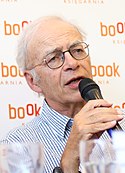Peter Singer Quote
For example, in many developing countries, children, and in particular girls, do not spend enough time at school, even when school is free, to learn as they should. To change this, the following strategies have been suggested: •Unconditional cash transfers for girls; •Cash transfers for girls, conditional on attendance; •Merit scholarships for girls; •Free primary school uniforms; •Deworming through primary schools; •Providing information to parents about the increased wages of those who stay at school. All of these strategies look plausible. When resources for education are scarce, as they always are, especially in developing countries, which one should be tried? In the absence of randomized testing, it would be impossible to know. But the Jameel Poverty Action Lab has tested them and found that the last one on the list is by far the most cost-effective. Every $100 spent on providing information to parents about the increased wages of those who stay at school results in an amazing 20.7 additional years spent at school! Deworming through primary schools is also highly cost-effective, leading to 13.9 additional years spent at school per $100 spent. Of the remaining interventions, the first two are relatively ineffective, both gaining less than 1 additional year per $100, and the cash transfers, whether conditional or unconditional, gain less than one-tenth of an additional year per $100.8 The most effective method thus results in more than two hundred times the benefits of the two least effective methods, which means that for every $100 spent on one of the least effective methods, $99.50 is wasted. When resources are limited and education is so important to the future of children, that waste means that many human beings do not achieve their full potential.
For example, in many developing countries, children, and in particular girls, do not spend enough time at school, even when school is free, to learn as they should. To change this, the following strategies have been suggested: •Unconditional cash transfers for girls; •Cash transfers for girls, conditional on attendance; •Merit scholarships for girls; •Free primary school uniforms; •Deworming through primary schools; •Providing information to parents about the increased wages of those who stay at school. All of these strategies look plausible. When resources for education are scarce, as they always are, especially in developing countries, which one should be tried? In the absence of randomized testing, it would be impossible to know. But the Jameel Poverty Action Lab has tested them and found that the last one on the list is by far the most cost-effective. Every $100 spent on providing information to parents about the increased wages of those who stay at school results in an amazing 20.7 additional years spent at school! Deworming through primary schools is also highly cost-effective, leading to 13.9 additional years spent at school per $100 spent. Of the remaining interventions, the first two are relatively ineffective, both gaining less than 1 additional year per $100, and the cash transfers, whether conditional or unconditional, gain less than one-tenth of an additional year per $100.8 The most effective method thus results in more than two hundred times the benefits of the two least effective methods, which means that for every $100 spent on one of the least effective methods, $99.50 is wasted. When resources are limited and education is so important to the future of children, that waste means that many human beings do not achieve their full potential.
Related Quotes
About Peter Singer
On two occasions, Singer served as chair of the philosophy department at Monash University, where he founded its Centre for Human Bioethics. In 1996, he stood unsuccessfully as a Greens candidate for the Australian Senate. In 2004, Singer was recognised as the Australian Humanist of the Year by the Council of Australian Humanist Societies. In 2005, The Sydney Morning Herald placed him among Australia's ten most influential public intellectuals. Singer is a cofounder of Animals Australia and the founder of the non-profit organization The Life You Can Save.
